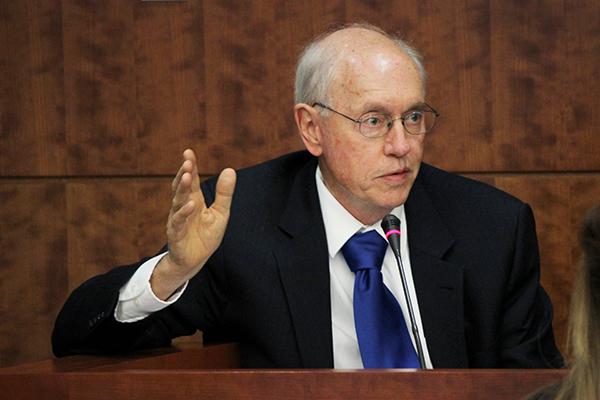It’s finally almost over.
The Faculty Senate voted Friday to approve an amended resolution which will allow non-tenured faculty from the School of Medicine and Health Sciences and the School of Nursing to participate in the group.
While the medical school will be able to have non-tenured faculty involved permanently, the amendment from the original resolution will only allow nursing school faculty to participate for three years, and excludes the Milken Institute School of Public Health entirely.
The resolution will be voted on by the Faculty Assembly in the fall, which is made up of all faculty at GW. Parts of the measure will be reworded to emphasize that the Faculty Senate should consist of tenured faculty. Because non-tenured faculty do not have the job security of a tenured professor, they may be less able to freely express their opinions – a key part of the academic freedom that tenured professors enjoy.
Faculty Senate members have said they are concerned that the proposed changes in these resolutions could weaken the governing power of the group by eventually leading to an inclusion of non-tenured faculty from all schools at GW.
The Faculty Senate has voted on similar resolutions dealing with participation of non-tenured faculty members for the better part of a year. The Faculty Assembly voted in the fall to not include all non-tenured faculty in the decision-making process.
The Board of Trustees originally introduced the idea of expanding participation rights last year after meeting with groups of faculty members while examining how decision-making is done at GW.
Theodore Barnhill, a professor of finance and member of the professional ethics and academic freedom committee on the senate, said passing this resolution just for certain schools would lead to other schools asking for their non-tenured faculty to be included in decision-making too.
“This is predominantly a structurally poor proposal,” Barnhill said. “There is no good explanation for why we should include one or two or three schools but not all schools.”
While the medical school, with a large number of clinical faculty that are unable to gain tenure, had garnered a larger amount of support for the resolution in regards to that school, many Faculty Senate members felt that the nursing school and the public health school did not have sufficient reason to be considered for membership in the group because they are newly founded schools.
The problem of a lack of tenured faculty in the nursing school is a short-term problem that should not be fixed with a long-term solution, Philip Wirtz, a business professor and chair of the education policy committee, said during Friday’s meeting. The nursing school currently has 11 tenure-track faculty members.
“They don’t currently have enough tenured faculty but we can solve that problem on a temporary basis. There’s no reason to not solve that on a temporary basis,” Wirtz said.
With the amended version the senate passed on Friday, the nursing school has a three-year period during which non-tenured faculty can serve on the senate as they build up the number of tenured faculty in the school. After three years, the Faculty Senate will reevaluate whether the school should continue to allow non-tenured faculty to serve.
Karen McDonnell, a professor of public health and member of the senate, asked that the resolution include the public health school due to a large percentage of clinical faculty and a public health school faculty who have indicated they want to be a part of decision-making processes. However, the amendment excluded the public health school.
“Our faculty have spoken quite clearly on how they want representatives to be represented. This is a faculty senate, and they are faculty members,” McDonnell said.
While some were unhappy with what they saw as the “disenfranchisement” of the public health school, others urged the Faculty Senate to take the steps that they could to alleviate the problem for now.
Arthur Wilmarth, a law professor and the chair of the professional ethics and academic freedom committee that introduced the resolution, encouraged the senate to solve a temporary problem through an amendment to the resolution.
“Let’s not let the perfect be the enemy of the good,” Wilmarth said. “Let’s give a temporary patch to the problem.”








